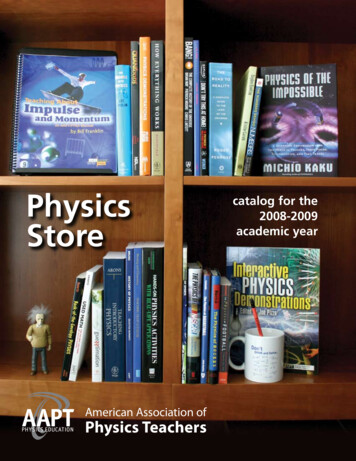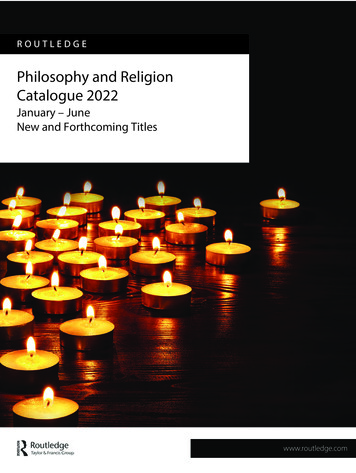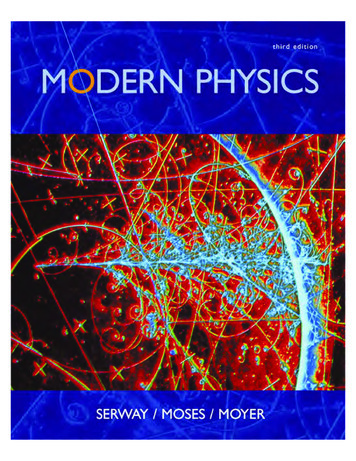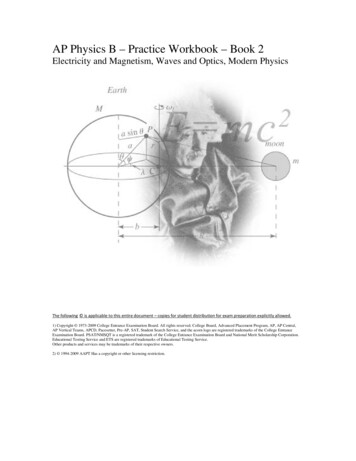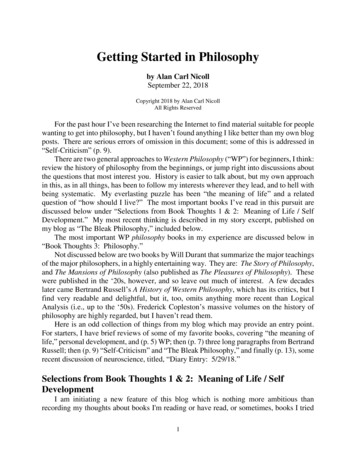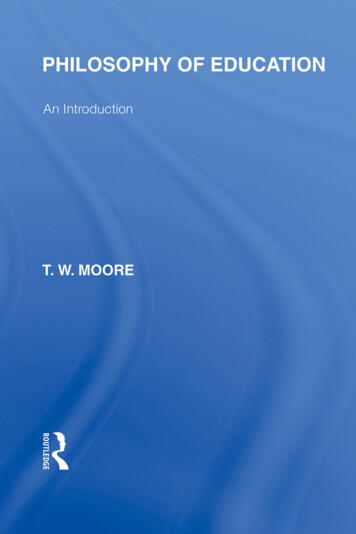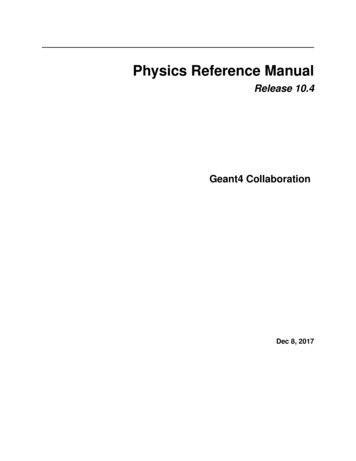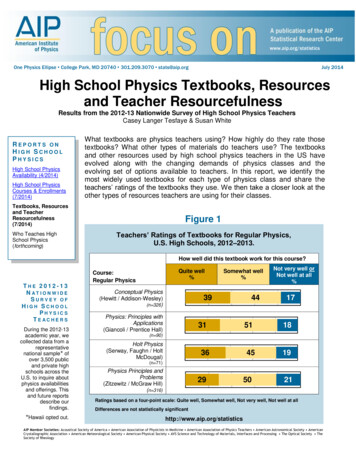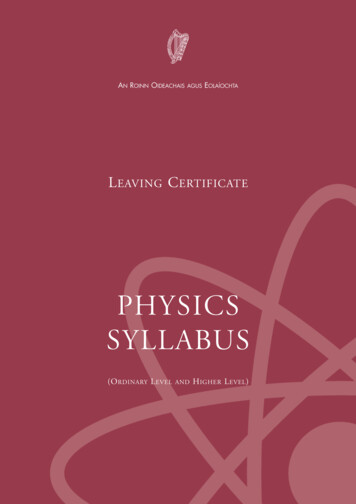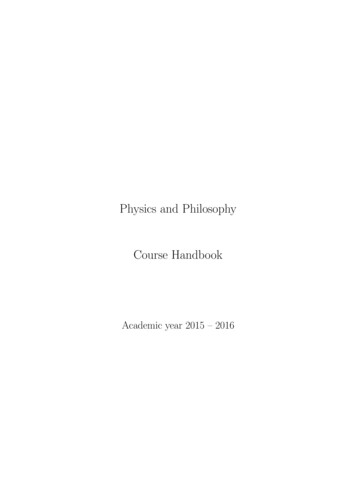
Transcription
Physics and PhilosophyCourse HandbookAcademic year 2015 – 2016
CONTENTSiContents1 Introduction12 Teaching33 Assessment74 The First year: Prelims95 The Second Year: Part A116 The Third Year: Part B147 The Fourth Year: Part C188 If things go wrong23
1INTRODUCTION11IntroductionPhysics and Philosophy (PP) is a relatively small school at Oxford, but there isa thriving physics and philosophy community all the same; dispersed though it isamong the colleges, you will find that there are frequent opportunities to meet withothers on the course. You should introduce yourselves on your arrival at Oxford, toeach other and to some of the faculty whom you will be seeing regularly throughoutthe course.Get to know your fellow physicists. You must attend the induction for all students entering physics degree courses (including PP). It is held on the Friday of theweek before full term begins (“0th Week”), from 2.15 pm to 4.15 pm. To keep thenumbers manageable, physics students are split by college into two groups that startat different places and then swap over at half-time; However all PP students shouldfollow the Group B schedule and start in the Martin Wood Lecture Theatre in theClarendon Laboratory. This has the advantage that, by omitting the lab tour youcan come to the PP Induction meeting by 3.30 pm (see below).Get to know your fellow PP students. Come to the Introductory Meeting forPhysics and Philosophy, held immediately following the Induction for Physics, inthe Colin Matthew Room (on the ground floor, Radcliffe Humanities), any timeafter 3.30 pm — come along when you have finished the Physics Induction session.This doubles as the annual Tea Party for PP students from all the years of the course.(When there is a vacancy, which there isn’t this year, it is at the Tea Party that thestudent representative on the Joint Standing Committee for Physics and Philosophyis elected.)Get to know your fellow philosophy students. Your college probably has students doing most or all of: Philosophy, Politics and Economics (PPE), Philosophyand Psychology, Philosophy and Physiology, Maths and Philosophy, Philosophy andModern Languages, and Literae Humaniores (Classics). All are joint Philosophycourses; most of them overlap with your Philosophy syllabus to a greater or lesserextent.
1INTRODUCTION2Using this bookThe Course Handbook is intended to give you the essential information about thedegree course; much more information is available online at the Physics and Philosophy websites, and you will also want to consult the Physics course handbook.The next two sections deal with teaching and with assessment; after that, there isa section on each year of the degree course; finally, there is a section on variousproblems that might (though we hope won’t) arise on your course.Really, you should read the whole handbook now (it’s quite short; you’ll have toread much longer things on this course!) But you should at least begin by readingsections 2 and 3 (on teaching and examining) and section 4 (on the first year).Later, you’ll want to look at the sections on each year of the course well in advanceof starting that year.Comments on this Handbook, as on any other aspect of the course, are welcome.The Course is run by a Committee, the Joint Standing Committee for Physics andPhilosophy, with members from both the Physics department and the Philosophyfaculty, and a student representative. The student representative usually serves forone or two years, and is elected at the Tea Party referred to above. The Committeeapproves all the regulations governing the course and reviews the exam reports thatindicate how well the course is running.Contact details for the Joint Committee are as follows:Chair:Dr Christopher Palmer t Representative:Tom Davidson (Balliol)thomas.davidson@balliol.ox.ac.uk
2TEACHING23TeachingYour tutorsAnybody to whom you go for tutorials or college classes counts as one of your tutors.In Physics and Philosophy there are bound to be at least two of them, and thereare likely to be six or more over the four years. Some will be tutorial Fellows orLecturers of your own college; some may be tutorial Fellows or Lecturers of othercolleges, or Research Fellows, or graduate students. The overall responsibility forgiving or arranging your tuition will lie with tutorial Fellows or Lecturers of yourown college, probably one in each of Physics and Philosophy.It will probably be a rule of your college that you call on these in-college tutors atthe beginning of term to arrange tuition, and at the end of term to arrange vacationreading and next term’s subjects. In any case it is a very good idea to pay such calls,if necessary on your own initiative. Colleges have different rules about when term‘begins’. The official start for University purposes is Sunday of First Week of FullTerm, but you will almost certainly be required by your College to be back by someday in the middle of 0th week. You should try to ensure that by the Sunday youknow who your tutors for the term will be, have met or corresponded with them,and have been set work and assigned tutorial times by them.
2TEACHING4TutorialsThe arrangement of Tutorials is the responsibility of your college. The tutorial system at Oxford provides highly personalised guidance on your studies — in particularto give you feedback on your written work and on problem-solving exercises — but itonly functions properly if you prepare for them well. Tutorials are not individualisedlectures, they do not provide synopses of topics or of books. For the great majorityyou will have written an essay or completed a problem set, and invariably you willhave studied a prearranged topic: in tutorials your own reasoning and argumentationwill also be searchingly scrutinized.What you are expected to bring to a tutorial is knowledge of the reading whichwas set for it, and answers or at least attempted answers to problem sets. What youhave a right to expect is your tutor’s presence and scholarly attention throughoutthe hour agreed, plus guidance, e.g. a reading list, for next time, and feedback —which may be verbal or written — on any work you have produced. Beyond thatstyles differ, depending on how many students are sharing the tutorial, the natureof the topic, and above all the habits and personality of your tutor. You must notexpect uniformity, and you will gain most if you succeed in adapting to differences.You will normally have more than one tutorial a week — on average two — andyou can expect to be set written work for every tutorial. Some of it, especially inphilosophy, will be tutorial essays. You will quickly learn what is expected, thoughit may take many terms’ practice to perfect your technique of getting a philosophicalargument across.Work on a tutorial essay involves library searches, reading, thinking, and writing,and it will take a minimum of two days — often three — to do properly. Readattentively and thoughtfully, skipping bits that obviously do not bear on your topic:one hour of that is worth many hours of ‘summarising’ paragraph by paragraph withthe music on! As your reading progresses, think up a structure for your essay (but donot write an elaborate plan which you won’t have time to execute). Expect to haveto worry out your thoughts, both during and after reading. Use essays to developan argument, not as places to store information. As you write, imagine that theaudience is not your tutor, but people you are seeking to interest and instruct —e.g. one of your peers. You will learn a lot if you share ideas with fellow students,and if you chance your arm in tutorial discussion. Remember that tutorials are notdesigned as a substitute for lectures, or for accumulating information, but to teachyou how to think, write and argue in a clear and articulate way. You should takenotes during a tutorial, but mainly they should concern the feedback you are gettingon your written arguments.Some tuition is by means of College classes, a system specially suited to subjects in which your written work is exercises. In these cases, just as for tutorials,attendance is compulsory. In philosophy, colleges often use classes for logic teaching.Oxford trains you as a writer to meet deadlines; so equip yourself with a writer’stools — a dictionary, such as the Concise Oxford Dictionary, and, unless you arevery confident, a thesaurus and Modern English Usage.
2TEACHING5LecturesEach term lecture lists for Physics and Philosophy are published on the respectivewebsites which cover all physics and philosophy lectures. You can find these at Philosophy — www.philosophy.ox.ac.uk/lectures Physics — www.physics.ox.ac.uk/lecturesLectures form the backbone of the Physics and Philosophy course, and are thereto present you with an overview of a given field in philosophy or physics. Althoughcore lectures are not compulsory, you may be seriously disadvantaged in examinations if you have not attended them: it is the material covered in lecture courses (notcourses of tutorials) that dictates the questions set for examinations. The core lectures in philosophy correspond to particular philosophy subjects and their associatedexamination papers (and are usually named after them); they are clearly marked assuch in the Philosophy Lecture Prospectus and the Philosophy Lecture List on thePhilosophy link above. Philosophy lectures are generally given in the PhilosophyFaculty Centre in the Radcliffe Humanities Building, or in the Examination Schoolson High Street.The core lectures in physics in the first three years of the course are given in oneof the larger lecture theatres in the physics department, the Martin Wood or theLindemann (both in the Clarendon Laboratory). Each core paper has one or twoassociated lecture courses. Learn to take notes at lectures; they will be useful to youlater, when you can fit them into a wider picture.VacationsBritish degree courses are among the shortest in the world. They hold their own ininternational competition only because they are full-time courses, covering vacationsas well as terms. This is particularly true of Oxford, where the eight-week terms(called Full Terms) occupy less than half the year. Vacations have to include time-offfrom study, and very likely they include time-off to earn money, but still study invacations is vital to completing the degree.Sometimes you will be assigned specific tasks to do in vacations, but you shouldalways review the material you have learned the term before. Often, you will haveto sit a college exam (a “collection”) on this material at the start of the next term.
2TEACHING6LibrariesThe library provision in Oxford University is very good but can seem rather complex.Physics & Philosophy students will need to use a variety of libraries during their timein Oxford. The main ones relevant to you are: Your college library. This will have a good selection of books which can beborrowed, although it doesn’t have the same provision as the main Universitylibrary system. You can only use your own college library: you can’t borrowfrom another college. The Philosophy and Theology Faculties Library, in the Phliosophy FacultyCentre (part of the Radcliffe Humanities Building on Woodstck Road). Thisis a lending library directed specifically to the needs of undergraduates. Youshould enrol there as soon as you can — there will be an library inductionmeeting in 0th week, but if you miss that you should enrol as soon as possible.Its holdings in philosophy subjects that you will study for the PP degree arequite comprehensive. The Bodleian Library, on Broad Street. The Bodleian is a reference librarywith a very extensive philosophy collection. The Radcliffe Science Library, on Parks Road. This is a mixed reference andlending library, with books in philosophy of science as well as in physics.You will also find that almost all journal articles, and increasingly many books, areavailable online. You can search the entire Oxford library system from the centrallibrary website at the finding resources page of the Bodleian Library website. Inparticular, SOLO is the University’s unified catalogue, and Oxford University ejournals is a gateway to its collection of electronic journals. Looking at a library’sweb page can provide you with further information about specific services or therules and regulations of each library.Academic Good Practice and PlagiarismThere is a lot of good advice about Academic Good Practice on the relevant section of the University Website. In particular there is a separate page devoted tothe definition of and guidance relating to plagiarism. Plagiarism is the copying orparaphrasing of other people’s work or ideas into your own work without full acknowledgement. All published and unpublished material, whether in manuscript,printed or electronic form, is covered under this definition. Collusion is anotherform of plagiarism involving unauthorised collaboration of students (or others) ina piece of work. Cases of suspected plagiarism in assessed work are investigatedunder the disciplinary regulations concerning conduct in examinations. Intentionalor reckless plagiarism may incur severe penalties, including failure of your degree orexpulsion from the university. You should also see the Philosophy Faculty’s Adviceon Plagiarism.
3ASSESSMENT37AssessmentCollege assessmentYour tutor will give you some feedback — either oral or written — on any work youproduce for them. Some tutors may give you a numerical mark, but not all will —and tutorial essays shouldn’t be thought of just as mock exam papers: they have adifferent purpose. If you have handed in work and not got some kind of feedback onit within a week or two, it’s worth reminding your tutor.At the end of each term you will be given a report on your progress in tutorialsand classes, but your tutor is not formally examining you, and your tutor’s opinionof you plays no part in determining the class of your degree — your tutor is thereonly to assist you in your studies.Most colleges will require you to sit college examinations, ‘collections’, beforethe start of each term. The objects are to test your comprehension of work alreadycovered, and to practise you in writing timed papers. Make sure at the end of eachterm that you know the times and subjects of next term’s collections. You have aright to expect collections to be marked and returned to you with comments, usuallywithin about three weeks of your sitting the collection.University examsYour degree classification is based entirely on the University’s (not the College’s)assessment of your performance, and that performance is mostly assessed throughexams at the end of each academic year. It is your personal responsibility to enterfor University examinations, and if you enter, or change your options, after the duedate, you must pay a late fee and gain the examiners’ consent; Entry is throughcolleges, and in most colleges, the college administrative staff will ensure you enteron time. The timetable for each set of exams will be sent to you early in the termwhen you sit them, and can also be found on the university’s Academic Serviceswebsite.The exams at the end of the first year (“Prelims”) determine whether you cancontinue into the second year, but don’t count towards your final degree class. Possible results are Distinction, Pass, Pass in some papers, or Fail; if you fail some orall papers, you have to re-take the corresponding papers in a repeat examination inSeptember, unless you fail more than one of the three physics papers, in which caseyou must re-take all three physics papers. Once you pass in all your papers (either inJune or September), you are said to have “completed the First Public Examination”,and can go on into the second year.The exams at the end of the second, third and fourth years are all called “Finals”,and together they determine your degree class: possible results are Class 1 (“First”),Class 2 Division 1 (“2:1”), Class 2 Division 2 (“2:2”), Class 3 (“Third”), Pass, orFail.At University examinations, you must wear academic dress with sub-fusc clothing. If you don’t know what it is, follow the link! You really don’t want to be deniedentrance to your exams!There are special University regulations on the typing of illegible scripts (NB: ’the
3ASSESSMENT8cost of typing and invigilation shall not be a charge on university funds’), on the use oftypewriters in examinations, on blind candidates, on dyslexic candidates, on religiouscandidates unable to take papers on certain days, on the use (where permitted)of calculators in examinations, and on the use (where permitted) of computers inexaminations; see the Examination Regulations, or ask your tutors.If you have any problems connected with University examinations which youwant to take further, never approach the examiners directly; ask your college tutor,who will take the matter forward to your college’s Senior Tutor, or ask the SeniorTutor directly. The Examiners are statutorily forbidden to accept communicationsfrom individual candidates except through the Proctors, who respond to cases raisedby Senior Tutors. This applies to complaints too (although every student has astatutory right to consult the Proctors directly on any matter at any time in theirOxford career). The regulations for PP Prelims and Finals are in the online ExamRegulations.Marking and ClassificationThis section deals with procedures and conventions applied by examiners in theprocess of marking scripts and assigning results in Finals. The examiners markusing criteria drawn up by the Philosophy Faculty and the Physics Department, butthey have a large degree of autonomy in their decisions.Each paper you write is marked out of 100. A mark of 70 or higher is first class,60-69 is 2:1, 50-59 is 2:2, 40-49 is third class, and anything below 40 is a failing mark.You can find more information about the way individual papers are marked in thephysics handbook (for physics) and here (for philosophy).Your overall classification is based on the weighted average of your marks: The papers you do at the end of the 2nd year (which are all physics papers)get a total weight of 2; The papers you do at the end of the 3rd year (which are a mixture of physicsand philosophy) get a total weight of 5 12 ; The papers you do at the end of the 4th year (which will be physics, philosophy,or both) get a total weight of 4.The simplest way to get a First is to perform, on average, at the First class level:that is, to get a weighted average of 70. But you can also get a First if you havea weighted average of 70 in either physics, or philosophy, provided that you getat least an average of 67 overall, and that the majority of your papers are in yourstronger subject. Similarly, you can get a 2:1 either by getting a weighted average of60 overall, or by getting a weighted average of 60 in one subject or the other and aweighted average of 57 overall. More details of the classification rules can be foundhere.
4THE FIRST YEAR: PRELIMS49The First year: PrelimsSyllabus and ExaminationsPP Prelims consists of five written papers: three in Physics, each of 2 12 hours, andtwo in philosophy each of three hours. There are no optional papers in the first year.The three papers in physics and mathematics are: CP1 Physics 1, CP3 Mathematical Methods 1 and CP4 Mathematical Methods 2. CP1 deals with mechanicalprinciples expressed in more abstract and mathematical ways than you have probably been used to, and also provides a first introduction to Special Relativity. Yourpreparation for CP3 and CP4 equips you with the concepts you will need to studyfield theory and quantum mechanics: differential and integral calculus in one andmore variables, complex numbers, vectors and matrices, and the mathematics ofwave motion. The detailed syllabuses for CP1, CP3 and CP4 are given in AppendixC of the Physics Handbook for a comprehensive guide to the schedule of lectures,including the Induction and Safety meetings. Note that you do not have to undertake any experimental work in your first year; however you can if you wish, providedyou have been to the Safety lecture; otherwise you must attend at the beginning ofyour second year.Your philosophy tutorials will be arranged for you by your college tutor in philosophy. Tutorials and lectures for Elements of Deductive Logic are the same forPhysics and Philosophy and Maths and Philosophy. The lectures are given in HilaryTerm; there is also an introductory course of lectures in Michaelmas Term, intendedfor PPE students as well. In addition your college will arrange tutorials or classesfor the Introduction to Philosophy paper.The lecture class devoted to the Leibniz-Clarke Correspondence is specificallyintended for first-year PP students. During these lectures, you will be introducedto your peers in the PP degree course from other colleges, as well as to faculty whospecialise in philosophy of physics. Attendance of this class is required of all PPstudents. Your college will also arrange tutorials or classes on the Leibniz-ClarkeCorrespondence.
4THE FIRST YEAR: PRELIMS10First Year Sample TimetableMTLecturesTutorials / ClassesHTLecturesTutorialsTTLecturesTutorials and classesMTLecturesHTTutorials / ClassesLecturesTTTutorials / ClassesLecturesTutorials / Classes1st year philosophyIntroduction to Logic (as for PPE)Introductory Logic(8 classes) General Philosophy (4 tutorials)General Philosophy; Elements of Deductive LogicElements of Deductive Logic(8 classes); General Philosophy(4 tutorials)Leibniz-Clarke CorrespondenceLeibniz-Clarke (4 tutorials)1st year physicsCP1 (Physics 1); CP3 (Mathematical Methods 1);CP4 (Mathematical Methods 2)CP1 (3-6); CP3 (3-4); CP4 (3-4)CP1 (Physics 1); CP3 (Mathematical Methods 1);CP4 (Mathematical Methods 2)CP1 (3); CP3 (4); CP4(2-4)Revision for CP1, CP3, CP4CP1 (2); CP3 and CP4 (4)Your college tutors may vary your timetable; if they do, make sure you understand what the overall structure of the year is at your college.
5THE SECOND YEAR: PART A511The Second Year: Part ASyllabus and Examinations: PhysicsYou take PP Finals Part A at the end of Trinity Term of your second year. Itis entirely Physics: there is no examination on Philosophy work until the Part Bexaminations in the third year, although you will work towards Part B philosophyin both the second and third years.The Part A examination consists of three physics papers:A1: Thermal Physics (three hours);A3: Quantum Physics (three hours);A2P: Electromagnetism (1 hour 40 min.).The syllabuses for A1 and A3 are the same as for Physics Part A and are given inAppendix D of the Physics Handbook. The syllabus for A2P is the same as that forPaper CP2 in Physics Prelims but without the topics in circuit theory or optics (seeAppendix C of the Physics Handbook).For the experimental requirements in PP Finals Part A, two short training sessions (on the oscilloscope and Origin software) and two Physics Practicals mustbe completed by the end of your second year. They are: Free and bound electrons(Practical GP14 in the Handbook of the Physics Practical Course) and Stern-Gerlacheffect (Practical OP15). Note particularly that you must have attended the SafetyLecture in the Physics Department before you can do any experiments. You mayhave done so in your first year, but if not then please be sure to attend in your secondyear, usually given on Monday of First Week of Michaelmas Term at 2.00 p.m. inthe Martin Wood Lecture Theatre. You will be asked to sign a safety declaration.Full details of how to find a partner if you need one, and how to book, are in theParts A and B Practical Course Handbook.Also as part of the requirement for PP Finals Part A, in Hilary Term of yoursecond year you must give a short talk (as do the physicists). This is intended as anexercise to help you develop your skills in oral communication. It will be assessedby your college tutor, and will be preceded by a lecture in the Physics Departmentgiving guidance on how to give a talk. As an alternative to this you can instead takethe Physics in Schools option which involves some classes on teaching physics, andsome time in local secondary schools. For more details on this option see the PhysicsHandbook.There is one more very important point to note about the second year Physicscourse, concerning Mathematical Methods. There is a 20-lecture course on this inMichaelmas Term of the second year, the syllabus for which is given in Appendix Dof the Physics Handbook, and a 6-lecture course on Probability and Statistics. Thismaterial is not attributed to any specific paper in Part A, but “short questions onmathematical methods will be set on one or more of papers A1, A2 and A3” (A2and A3 are the ones required for PP). Further, “one long question on mathematicalmethods may be set in one of papers A1, A2 and A3”. PP students are stronglyadvised to take this Mathematical Methods course very seriously, as it underpins allthe theoretical parts of the physics course.
5THE SECOND YEAR: PART A12Syllabus: PhilosophyYour second and third year philosophy work is examined together at the end ofthe third year. There are three “core choices” (everyone must do these), and one“elective choice” (you can either do this, or more physics). The elective choice isalmost always taught in the 3rd year, so it’s discussed in that section.Your core choices are as follows (note that all Philosophy Finals papers have a3-digit code to identify them):1. A core Philosophy paper. This can be either Knowledge and Reality (102)or History of Philosophy from Descartes to Kant (101). In either paper, youwill be studying core questions of metaphysics and epistemology: questionsabout existence, modality, time and identity (metaphysics), and questionsabout truth, knowledge, and observation (theory of knowledge, or epistemology). The choice between the two papers is to a large extent about two styles oflearning: one organised around specific ideas, the other around specific texts.Both have value (and nothing prevents you doing the other one of the twopapers later in the course).2. A Philosophy of Science paper. This is normally Philosophy of Science (124),but you can choose Philosophy of Science and Social Science (106) instead.Philosophy of Science is concerned with questions about what science is andhow it connects to the world: are our scientific theories guides to truth, orare they just pragmatic ways of organising our observations? In what sense isscience a rational process, and what is scientific method?3. Intermediate Philosophy of Physics (120). This comes in two halves: Philosophy of Special Relativity, and Philosophy of Quantum Mechanics.In the second year you will normally study the core philosophy paper, along withthe Special Relativity half of the Intermediate Philosophy of Physics paper, but somecolleges take the philosophy material in a different order.
5THE SECOND YEAR: PART A13TeachingIn Physics, teaching for Part A papers consists of lectures together with a mix ofclasses and tutorials, according to your college’s overall teaching arrangements.Teaching for the Philosophy part of your second (and later) year consists oflectures and tutorials (and occasionally classes). You should normally have eighttutorials, and a full course of lectures, in each philosophy subject that you study,though the level of tutorial provision can vary according to what your tutors prefer.Your college tutors will arrange the tutorials for you but it is your responsibilityto attend appropriate lectures. Normally you should attend the lecture courses forKnowledge and Reality or History of Philosophy in your second year, the part ofthe Intermediate Philosophy of Physics lectures that deals with Special Relativityin your second year, and the part that deals with Quantum Mechanics in your thirdyear. Note that the physics lecture list is arranged to minimise clashes with the corephilosophy paper in the second year, and the Philosophy of Science paper in thethird year, so you should go to the lectures in these years regardless of whether youare taking the tutorials in the same year — for philosophy it is often fruitful to takethe lectures at a different time from the tutorials in any case!Second Year Sample orialsLecturesTutorials2nd year philosophyStudents should consult their tutors on lectures relevantto their core philosophy paper and to their philosophy ofscience paper.101/102 (4)Intermediate Philosophy of Physics (Special Relativity) andother lectures as advised by tutors.101/102 (4)As advised by tutorsIntermediate Philosophy of Physics: Philosophy of Relativity (4)2nd year physicsA1 (Thermodynamics); A3 (Quantum Mechanics);Mathematical Methods (see under section 5)A1 (4-7); A3 (2); Mathematical Methods (4)A2P (CP2) (Electromagnetism); A1 (Statistical Mechanics); A3 (Quantum Mechanics; Further QM)A2P (2-5); A1 (3-4); A3 (4-6)A3 (Further QM); A2P (CP2) (Electromagnetism revision)A1 (1); A2P (1); A3 (2)Your college tutors may vary your timetable; if they do, make sure you understand what the overall structure of the year is at your college.
6THE THIRD YEAR: PART B614The Third Year: Part BSyllabus and ExaminationsThe examination for Physics and Philosophy Part B consists of a Physics and aPhilosophy component, as well as an elective paper which can be either Physics orPhilosophy. The formal requirements are given in the Exam Regulations.Physics: The physics component in Part B is chosen from the following list ofseven subjects, each examined as a half-paper of 2 hours:B1 Fluctuations, flows and complexity;B2 Symmetry and relativity;B3 Quantum, atomic and molecular physics;B4 Sub-atomic physics;B5 General Relativity and cosmology;B6 Condensed-matter physics;B7 Classical mechanics.You will have to choose three of these or, if
Using this book The Course Handbook is intended to give you the essential information about the degree course; much more information is available online at the Physics and Phi-losophy websites, and you will also want to consult the Physics course handbook. . own college, probabl

